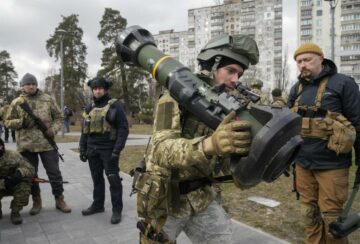
I sometimes get asked: “Why is America spending so much to help Ukraine?” My response is to Google “Rhineland, 1936″ or “Sudetenland, 1938.” Those were places where Adolph Hitler started his war across Europe, and where any level of resistance could have stopped his bloody march — and might well have saved the over 50 million lives lost in World War II.
Along with our European allies, America failed to see the threat and stem the tide of the Third Reich. Today, as Russian President Vladimir Putin continues his illegal, unprovoked attacks against Ukraine, with his sights set on the rest of Eastern Europe, history must not be allowed to repeat itself.
From the 1930s onward, it’s become ever clearer that a strong national defense is essential to protect the cause of freedom and save lives. That’s why the fiscal 2023 National Defense Authorization Act makes historic and necessary investments in the defense of America and the free world. Among other important provisions, such as raises for the troops, rebuilding a modern navy and upgrading our nuclear capability, the legislation includes the critical weapons and logistics support Ukraine needs — because if Putin is not stopped now, our allies in the Baltics, Poland and large swaths of Europe will be next.
Providing these tools to Ukraine is at the very crux of what it means to be a global leader. We must exercise this leadership to avoid mistakes of the past — and prevent a larger war in the future.
Our country has an enormous responsibility — whether we like it or not — as the leader of the free world. To avoid another global conflict, we must have the capacity to inflict unacceptable costs on any potential adversary and the will to impose those costs if necessary; simply put, our potential adversaries must fear the consequences of their actions. This concept of deterrence has been the heart of our defense strategy for over 70 years and is the guiding principle of the bill currently before us.
Included in the bill are initiatives to deter the global ambitions of dictators and autocrats by modernizing America’s nuclear defenses. It’s become clear to me while chairing the Senate Subcommittee on Strategic Forces — which oversees our nuclear triad — that the United States has failed to pace the threat. We must pass the NDAA to overhaul these essential deterrents and meet the growing threats of new weapons like hypersonic missiles and increased competition from Russia and China — not to prepare for nuclear war, but to prevent one.
These commitments do not come without cost, and while it is true that the United States spends more on defense than any other nation, no other country in the world has our global responsibility.
So, yes, our global leadership role means we spend more than other countries, but this needs a bit more context. In 1952, during the Korean War, about 70% of the federal budget went toward defense (it was even higher during World War II). And according to Congressional Research Service data, it has steadily trended downward over the decades. By 1987, it was about 28% of the federal budget. Today, our defense spending is only about 13% of our total federal spending. This is among the lowest levels in the last 70 years.
Similarly, defense spending relative to our total gross domestic product has been trending downward. Again, going back to 1952, defense spending as a percentage of GDP was around 13%, and in 1987, nearly 6% of our economy was committed to defense.
Today, only about 3% of our total economy is committed to defense spending, which few can argue is unreasonable given our uniquely global responsibilities and the magnitude of the threats we face.
We are living in a historic moment. As we have seen in our collective global history, had Hitler been confronted earlier — before he completely rebuilt the Nazi war machine — World War II might well have been avoided.
Less than 15% of our federal budget to fight off a brutal autocracy, prevent another war across Europe and save thousands if not millions of lives? To me, that’s one of the most important investments we could possibly make because the cost of war would far exceed these investments.
There’s no more solemn responsibility we have than to provide for the common defense. It’s part of the very preamble to the Constitution. So let’s learn from the mistakes of history, meet our global responsibility and pass this critical bill.
Sen. Angus King, I-Maine, chairs the Subcommittee on Strategic Force and serves on the Seapower and Airland subcommittees.
- SEO Powered Content & PR Distribution. Get Amplified Today.
- Platoblockchain. Web3 Metaverse Intelligence. Knowledge Amplified. Access Here.
- Source: https://www.defensenews.com/opinion/commentary/2022/11/29/prevent-the-mistakes-of-history-by-passing-the-fiscal-2023-ndaa/
- 15%
- 70
- a
- About
- According
- across
- actions
- against
- ambitions
- america
- among
- and
- Another
- argue
- around
- Attacks
- authorization
- avoided
- back
- Baltics
- because
- become
- before
- Bill
- Bit
- Bloody
- budget
- Capacity
- Cause
- China
- clear
- Collective
- come
- committed
- Common
- competition
- completely
- concept
- conflict
- Congressional
- Consequences
- Constitution
- context
- continues
- Cost
- Costs
- could
- countries
- country
- critical
- Currently
- data
- decades
- Defense
- Domestic
- downward
- during
- Earlier
- eastern
- eastern europe
- economy
- enormous
- essential
- Europe
- European
- Even
- EVER
- exceed
- Exercise
- Face
- Failed
- fear
- Federal
- few
- fight
- Fiscal
- Force
- Forces
- Free
- Freedom
- from
- future
- GDP
- get
- given
- Global
- going
- gross
- Growing
- Heart
- help
- higher
- historic
- history
- HTTPS
- Illegal
- images
- important
- impose
- in
- includes
- increased
- initiatives
- Investments
- IT
- itself
- King
- Korean
- large
- larger
- Last
- leader
- Leadership
- LEARN
- Legislation
- Level
- levels
- Lives
- living
- logistics
- machine
- make
- MAKES
- March
- means
- Meet
- might
- million
- millions
- missiles
- mistakes
- Modern
- moment
- more
- most
- nation
- National
- nazi
- nearly
- necessary
- needs
- New
- next
- nuclear
- ONE
- Other
- Overhaul
- Pace
- part
- Passing
- past
- percentage
- Places
- plato
- Plato Data Intelligence
- PlatoData
- Poland
- potential
- Prepare
- president
- prevent
- principle
- Product
- protect
- provide
- put
- Putin
- raises
- repeat
- research
- Resistance
- response
- responsibilities
- responsibility
- REST
- Role
- Russia
- russian
- Russian president
- Russian President Vladimir Putin
- Save
- Senate
- serves
- service
- set
- Sights
- simply
- So
- spend
- Spending
- started
- States
- Stem
- stopped
- Strategic
- Strategy
- strong
- subcommittee
- such
- support
- The
- The Future
- the world
- their
- Third
- thousands
- threat
- threats
- Tide
- to
- today
- tools
- Total
- toward
- trending
- true
- Ukraine
- United
- United States
- us
- Vladimir Putin
- war
- Weapons
- What
- whether
- which
- while
- will
- without
- world
- would
- years
- zephyrnet











